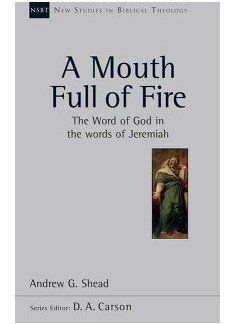A Mouth Full of Fire
Andrew G Shead
Apollos (IVP)
328 pages, £14.99
ISBN: 978-1-84474-596-8
Star Rating: 2
In this book Andrew Shead seeks to build a theology of the Word of God from the many references in the book of Jeremiah both to the Word and (for Shead, an important distinction) to the words of God. A cursory reading of Jeremiah would identify these recurring themes, and indicate a promising and important line of enquiry. Shead takes the Word of God as the ‘protagonist’ of the book of Jeremiah, and considers how this Word is conveyed to and through the prophet.
While not a commentary as such, this book helps to clarify the underlying structure and thought of Jeremiah. As a volume in Apollos’ New Studies in Biblical Theology, it is written for the world of scholarship and readers unfamiliar with academic and technical works will find it demanding. There is much interaction with non-evangelical writers, and objections to the author’s approach are considered in detail. On one occasion (p66) the author acknowledges that readers who are happy to accept his approach may skip part of a chapter while losing little of the wider argument. A similar note could have been inserted at other points in the book.
Shead understands the ‘Word’ of God in Jeremiah as the divine message, which is entrusted to the prophet in such a way that his own preached words can be described as the ‘words’ of God. In line with his calling, Jeremiah’s whole person, his deeds, his anguished prayers to God, are employed to convey God’s Word, foreshadowing the Word made flesh. The words of Jeremiah, as written down by Baruch and as read by successive generations of readers, remain the words of God. Shead notes how the power of God’s Word (and words) is repeatedly emphasised, even as its message is almost universally rejected, for the Word is effective in judgment even where it is not received in obedient trust.
From his overview of the Word in Jeremiah, Shead develops a doctrine of verbal inspiration, tentatively applied to other parts of Scripture, and contrasts it with the word theology of Karl Barth. Shead’s thesis boils down to 2 Peter 1 v 21 — ‘Holy men of God spoke as they were moved by the Holy Spirit’. Arguably, in re-establishing this doctrine from the text of Jeremiah, too many concessions are made to conflicting views of Scripture.
Alan Wells
Bromsgrove








